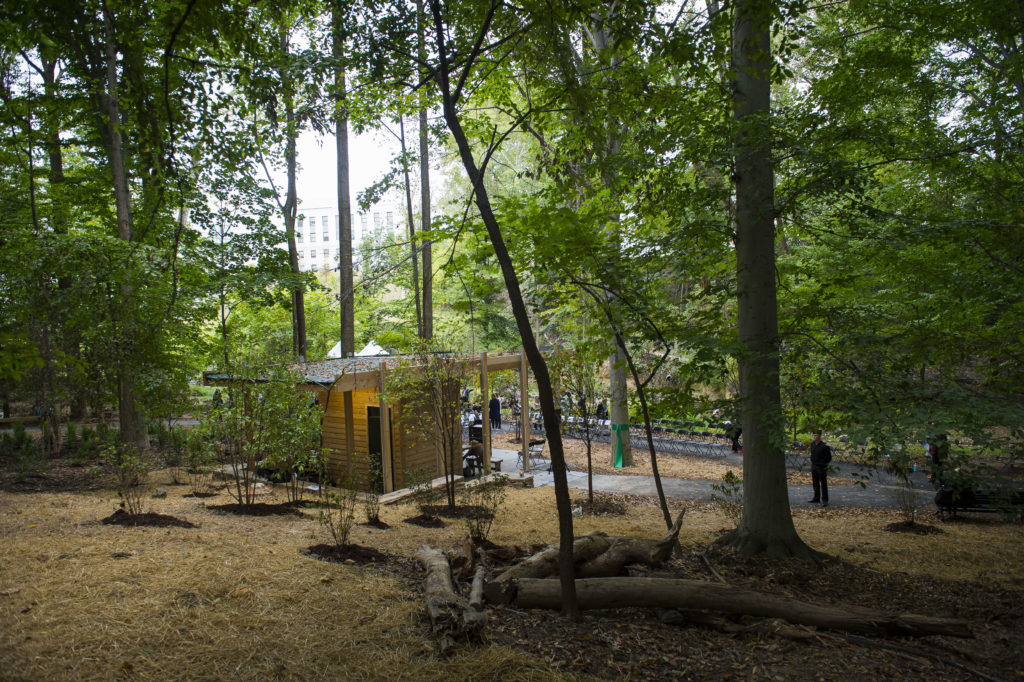We are taking the opportunity to get to know some of the different team members from our National Awards grantee projects. You can find previous interviews with other team members here.
For the brave men and women returning home from serving their country, mental and physical health are top priorities. The Green Road grantee project at Naval Support Activity Bethesda, home of Walter Reed national Military Medical Center, is seeking to provide these military service members with a more holistic approach to their healing from wartime.

Addressing health and well-being in conjunction with exposure to nature for these military service members is hoped to help improve the healing process. Dr. Brian Berman, president of the Institute for Integrative Health, studies and practices integrative medicine including mind/body approaches to healing that will be critical in the research conducted as a part of the Green Road Project.
We had the opportunity to ask Dr. Berman a few questions about his work with the Green Road Project.
Open Voices: How did you become involved with the Green Road Project?
Dr. Brian Berman: Four years ago, colleagues at the National Institutes of Health (NIH) introduced me to Fred Foote, MD, the visionary who conceived the Green Road Project. Fred had spent a decade working to bring the principles of holistic, person-centered care to the Military Health System through an initiative called the Epidaurus Project. In one of our early conversations, he asked me how the outcomes of holistic care could be measured. In pursuit of new answers to that question, we at the Institute for Integrative Health worked with Fred to convene a prominent team of scientists, including several Institute Scholars. That team collaborated on a novel set of metrics, some of which will be used to measure the Green Road’s healing effects.
Open Voices: You’ve had extensive experience with traditional Chinese medicine and have helped to bring that research to the NIH. How do you plan on incorporating that knowledge and experience into your work with the Green Road?
Berman: Traditional Chinese medicine looks at the relationship between the macrocosm of the universe (sometimes called the heavens) and the microcosm of mankind. With the Green Road Project, we’re looking at a similar paradigm: the relationship between the macrocosm of nature and the microcosm of human beings—specifically, the effects of nature on human health.
Nature affects us at all levels: mind, body and spirit. When people come into close contact with nature, it has a way infusing their spirit and bringing them closer to their own true nature. The impact of that on their psychological well-being, their emotions, and their mental state can be profound. The result of all this can be physical healing. We’re hopeful the Green Road Project’s research will shed light on this process.
Open Voices: Could you explain a little more what the principles of integrated health are and how nature plays into the discipline?
Berman: The field of integrative health values the whole person—mind, body and spirit—and is concerned with the broad, interrelated network of factors that influence health. These include, for example, nutrition, physical activity, and economic status, as well as environmental factors, such as air quality, temperature, light, and noise. This is where exposure to nature, or a lack thereof, plays a significant role.
As human beings, we know intuitively that spending time in the presence of nature is good for us. We simply feel better in a natural setting than we do when we’re surrounded by road traffic, buildings, and fluorescent lighting. Viewing scenes of nature has been shown to lower blood pressure, respiration rates and the production of stress hormones. Nevertheless, the health benefits of nature encounters are under-investigated and under-valued. That’s why quantifying nature’s impact and promoting the scientific evidence are so essential.
Open Voices: What sort of quantitative metrics will you and your team be looking to measure from the Green Road Project?
Berman: Our team of scientists at the NIH Clinical Center’s Pain and Palliative Care Service, the University of Arizona, and the Uniformed Services University of the Health Science will compare two sets of military service members: one that spends time on the Green Road and another that spends time on a route elsewhere on the base campus. Taking a novel approach, the study will examine diverse measures of stress, including biomarkers of the stress response, natural language processing of journals and stories, and changes in gene expression. This innovative combination of measures and their correlation with standard metrics, such as age and gender, will yield deeper insight into nature’s effects on human health.
Open Voices: Why do you think a community of military service members is a good group to observe with the Green Road Project to learn about the positive effects of integrative medicine?
Berman: Given their sacrifices for our country, service members deserve the finest care, including any modality that offers the potential for recovery and relief from suffering. Many service members on the Bethesda campus have endured extraordinary trauma that has penetrated them mentally, physically and spiritually. PTSD and traumatic brain injuries are among the most complex and challenging conditions to treat. The extent of the damage is great but so is the possibility for healing.
A significant part of a service member’s convalescence is the participation of their family, who are themselves in need of nurturing and support. As a shared experience, the Green Road can be restorative for individuals and for the family as a whole.

